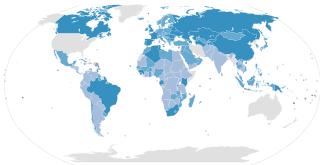Related Research Articles
"The Manifesto of the Italian Fasces of Combat", also referred to as the Fascist Manifesto or the San Sepolcro Programme being the political platform developed from statements made during the founding of the Fasci Italiani di Combattimento, held in Piazza San Sepolcro in Milan on March 23, 1919.

The Twenty-first Amendment to the United States Constitution repealed the Eighteenth Amendment to the United States Constitution, which had mandated nationwide prohibition on alcohol. The Twenty-first Amendment was proposed by the 72nd Congress on February 20, 1933, and was ratified by the requisite number of states on December 5, 1933. It is unique among the 27 amendments of the U.S. Constitution for being the only one to repeal a prior amendment, as well as being the only amendment to have been ratified by state ratifying conventions.

Actuarial science is the discipline that applies mathematical and statistical methods to assess risk in insurance, pension, finance, investment and other industries and professions. More generally, actuaries apply rigorous mathematics to model matters of uncertainty and life expectancy.

The ILO Convention Concerning Minimum Age for Admission to Employment C138, is a convention adopted in 1973 by the International Labour Organization. It requires ratifying states to pursue a national policy designed to ensure the effective abolition of child labour and to raise progressively the minimum age for admission to employment or work. It is one of eight ILO fundamental conventions. Convention C138 replaces several similar ILO conventions in specific fields of labour.

A convention, in the sense of a meeting, is a gathering of individuals who meet at an arranged place and time in order to discuss or engage in some common interest. The most common conventions are based upon industry, profession, and fandom. Trade conventions typically focus on a particular industry or industry segment, and feature keynote speakers, vendor displays, and other information and activities of interest to the event organizers and attendees. Professional conventions focus on issues of concern along with advancements related to the profession. Such conventions are generally organized by societies or communities dedicated to promotion of the topic of interest. Fan conventions usually feature displays, shows, and sales based on pop culture and guest celebrities. Science fiction conventions traditionally partake of the nature of both professional conventions and fan conventions, with the balance varying from one to another. Conventions also exist for various hobbies, such as gaming or model railroads.
Protection against Accidents (Dockers) Convention (Revised), 1932 is an International Labour Organization Convention.
Old-Age Insurance Convention, 1933 (shelved) is an International Labour Organization Convention.
Old-Age Insurance (Agriculture) Convention, 1933 (shelved) is an International Labour Organization Convention.
Invalidity Insurance Convention, 1933 (shelved) is an International Labour Organization Convention.
Invalidity Insurance (Agriculture) Convention, 1933 (shelved) is an International Labour Organization Convention.
Survivors' Insurance (Agriculture) Convention, 1933 (shelved) is an International Labour Organization Convention.
Fee-Charging Employment Agencies Convention (Revised), 1949 is an International Labour Organization Convention.
Medical Care and Sickness Benefits Convention, 1969 is an International Labour Organization Convention. It was established in 1969 revised Convention C24 Sickness Insurance (Industry) Convention, 1927 and Convention C25 Sickness Insurance (Agriculture) Convention, 1927.
Unemployment Provision Convention, 1934 (shelved) is an International Labour Organization Convention.
Maintenance of Migrants' Pension Rights Convention, 1935 (shelved) is an International Labour Organization Convention.
Paid Vacations (Seafarers) Convention (Revised), 1949 (shelved) is an International Labour Organization Convention.

Victor Laurence August Christgau was a politician and government official from Minnesota.
The following outline is provided as an overview of and topical guide to the United Nations:

The Berne Convention for the Protection of Literary and Artistic Works, usually known as the Berne Convention, was an international assembly held in 1886 in the Swiss city of Berne by ten European countries with the goal of agreeing on a set of legal principles for the protection of original work. They drafted and adopted a multi-party contract containing agreements for a uniform, border-crossing system that became known under the same name. Its rules have been updated many times since then. The treaty provides authors, musicians, poets, painters, and other creators with the means to control how their works are used, by whom, and on what terms. In some jurisdictions these type of rights are referred to as copyright; on the European continent they are generally referred to as authors' rights or makerright.

The Social Security Institution is the governing authority of the Turkish social security system. It was established by the Social Security Institution Law No:5502, which was published in the Official Gazette No: 26173 on June 20, 2006. This brought five different retirement systems that affected civil servants, contractual paid workers, agricultural paid workers, and self-employed workers into a single retirement system offering equal actuarial rights and obligations.